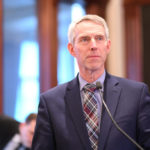
SPRINGFIELD, Ill. (IRN) — A downstate Republican lawmaker plans to refile a resolution to make Chicago the 51st state even as the new Speaker of the Illinois House is looking to bridge the divide between rural areas and urban areas.
On Thursday, Region 6 of the state part of the governor’s COVID-19 reopening plan was moved to Phase 4, allowing 50 percent indoor capacity. That’s the latest update in the governor’s mitigation efforts that has different regulations impacting different regions of the state depending on metrics like positivity rate.

State Rep. Brad Halbrook, R-Shelbyville, said the relaxed mitigation gives businesses struggling to stay open some certainty but said a one-size-fits-all approach on major policy issues does not work. That’s evident with COVID-19 mitigation, he said.
“There are differences between a Chicago that has 10,000-plus people per square mile versus my home county and a lot of my surrounding counties that have 29 people per square mile,” Halbrook said. “The densities are different and the way to handle those things are different.”
Gov. J.B. Pritzker last year had a statewide approach to mitigation with a statewide stay-home order for more than two months, but then split the state into quadrants before splitting the state up into 11 districts. Many rural counties for months haven’t enforced the governor’s closure orders on businesses.
Halbrook said the one-size-fits-all approach also doesn’t work for other issues, such as gun control.
“We’ve probably got in central and southern Illinois a per capita ownership of firearms greater than the city and yet we don’t have the issues with the firearms like they do in the city,” Halbrook said.
Halbrook plans to refile his resolution to make Chicago the nation’s 51st state, an effort that didn’t advance in the last term.
“We’ve further defined the matter, the issue,” Halbrook said. “Just focusing on this rural-urban divide, the difference of what’s happening in rural Illinois versus urban Illinois.”
Last week, House Speaker Chris Welch, D-Hillside, said he will work to address the divide between urban areas and rural areas.
“It’s all about trying to find what you can agree on first,” Welch said. “Once you do that and go through that process and build trust, you can start tackling more difficult issues.”
President Joe Biden also spoke about the divide on Wednesday.
“We must end this uncivil war that pits red against blue, rural versus urban, conservative versus liberal,” Biden said Wednesday. “We can do this if we open our souls instead of hardening our hearts.”
Halbrook said he’s encouraged by Welch’s words and hopes the voices of rural Illinois will be heard.
“I don’t understand some of that, why we seem to be brushed off,” Halbrook said to some who may dismiss concerns from rural representatives. “We represent 110,000 people (in each legislative district) just like everybody else and they deserve to be heard.”
Welch announced his leadership team of all Democrats, including state Rep. Larry Walsh Jr., D-Elwood, who will be his “Downstate Caucus Whip.”
The legislature returns on Feb. 2.
